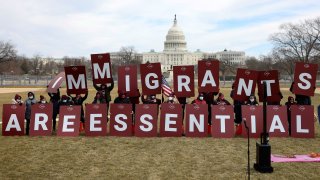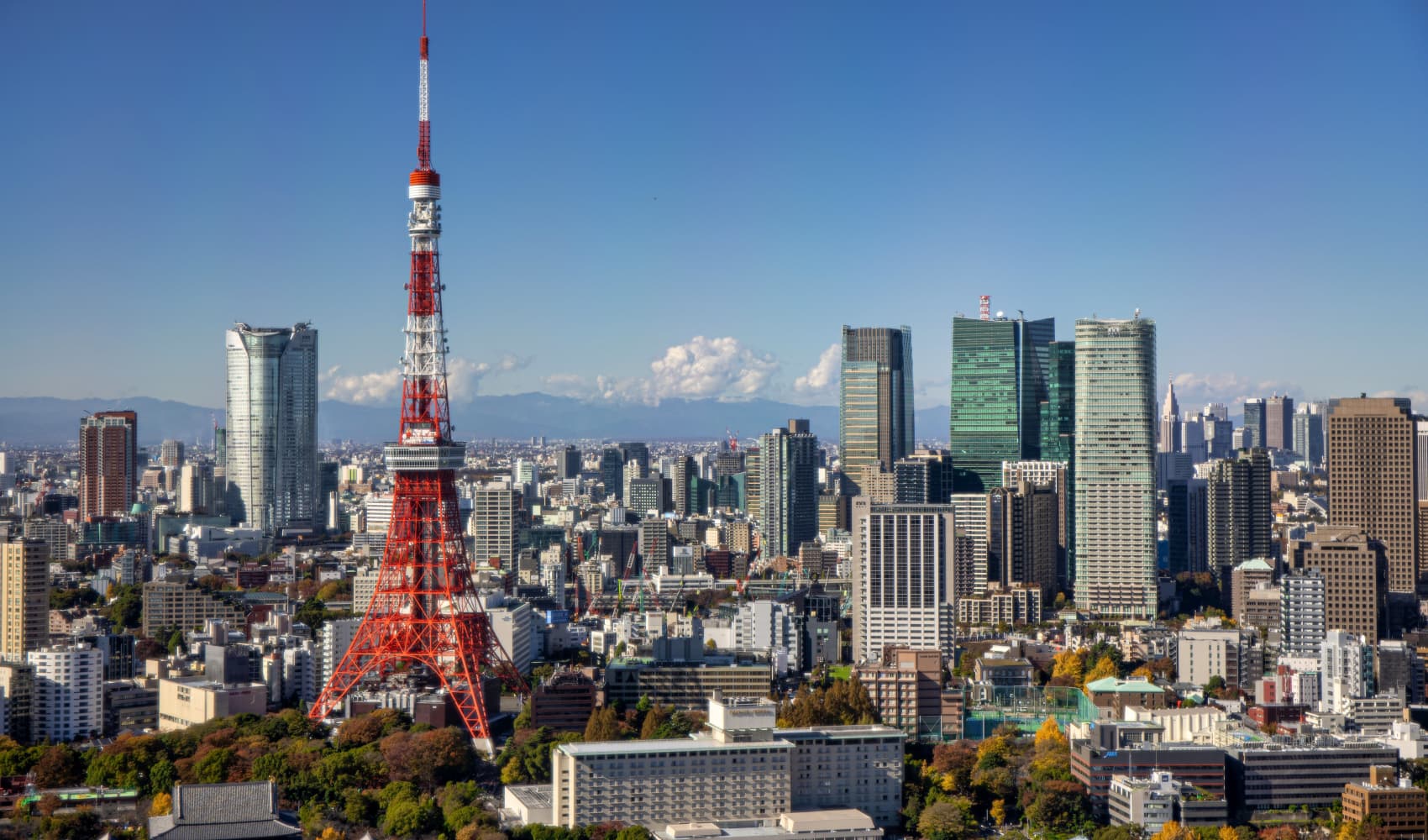
- Monthslong processing delays in U.S. Citizenship and Immigration Services facilities are jeopardizing international students' job offers and legal status.
- The delays constitute another challenge to the country's ability to recruit and retain highly educated and skilled students and workers from abroad, who have historically driven economic growth in the U.S.
- The processing lags come as the Biden administration and Secretary of Homeland Security Alejandro Mayorkas seek to reform the country's immigration system.
Ji Hyun came to the United States from South Korea to pursue her dream of becoming an intensive care unit nurse.
Now, she is one of many international students whose job prospects and legal immigration status are threatened by months long processing delays in U.S. Citizenship and Immigration Services facilities.
Ji Hyun graduated from nursing school in December and secured a job offer to work in the intensive care unit of a Georgia hospital. On Nov. 4, she mailed out an application for Optional Practical Training, a 12-month program that allows F-1 student visa holders to temporarily work in the U.S. in the field in which they studied.
Get Connecticut local news, weather forecasts and entertainment stories to your inbox. Sign up for NBC Connecticut newsletters.
By the time she got a receipt on Feb. 10 confirming USCIS received her application, it was too late. She lost her job offer. Her employer needed to have her approved work authorization by Feb. 8.
"I was following all the rules. I had all the qualifications and I was so ready to work," said Ji Hyun, who asked not to be fully identified to speak freely while her OPT application is still being processed by the agency.
It's not clear exactly how many students are affected by the delays, as USCIS has not released numbers. During the 2019 fiscal year, according to agency data, USCIS received 215,282 applications for OPT work authorizations.
Money Report
Processing delays like the one experienced by Ji Hyun constitute another challenge to the country's ability to recruit and retain highly educated and skilled students and workers from abroad, who have historically driven economic growth in the U.S.
The processing lags come as the Biden administration and Secretary of Homeland Security Alejandro Mayorkas seek to reform the immigration system.
"We still send graduates educated in our great universities back to their home countries instead of allowing them to drive innovation here in America," Sen. Bob Menendez of New Jersey said Thursday as congressional Democrats unveiled a comprehensive immigration bill backed by President Joe Biden.
CNBC interviewed half a dozen F-1 visa holders across the country affected by OPT processing delays, including a cybersecurity engineer, a postdoctoral fellow studying Covid in an infectious diseases laboratory and a breast cancer researcher.
All expressed anxiety and frustration as they've been left with no income and no health insurance while they wait for their applications to be processed with job offers and legal status on the line.
"I cannot really sleep for a whole night. And I cannot focus on reading or even watching a TV show," said Dan, 31, a recent Ph.D. graduate from the University of North Carolina at Chapel Hill, who asked to be identified by her first name only.
"What I can do every day is checking my email, calling the USCIS, calling my [International Student Services] department, trying to get any updates or any information related to this delay."
Processing delays
Yohanes, a 25-year-old cybersecurity engineer from Ethiopia, earned his bachelor's and master's degrees in the U.S. before pursuing a year of OPT.
On Nov. 6, Yohanes applied for the STEM OPT extension, a 24-month add-on for students who completed OPT employment in science, technology, engineering and math fields.
He didn't hear back until three months later, when he received a rejection notice from USCIS dated Feb. 2. His application was declined not because of issues with his candidacy, but because of questions about a credit card transaction, according to a copy of the notice viewed by CNBC.
Now, Yohanes is ineligible to refile for the STEM extension because his initial OPT authorization expired in January. When his 60-day grace period ends, he will have to leave the country.
"It's stressful and makes you hopeless. I've been here in the U.S. for almost eight years," said Yohanes, who asked to be identified only by his first name to speak freely about the issue as he seeks to appeal the rejection.
Delays in OPT application processing are not only affecting students' legal status and job offers, but also employers and the U.S. economy.
A 60% reduction in OPT participation would lead to the loss of 443,000 jobs over a decade, including 255,000 jobs held by native-born workers, according to a 2018 study by the Business Roundtable, an association whose members are chief executives at major companies in the U.S.
"This result reinforces the findings of myriad prior studies that show that foreign-born workers actually create jobs for native-born workers on aggregate, rather than displace them," the study said.
Almost 45% of Fortune 500 companies were founded by immigrants or their children, according to a 2019 study by bipartisan research and advocacy organization New American Economy.
Immigration lawyer Greg Siskind said the processing delays could interrupt recruitment for high-skilled positions and industries across the country.
"It can have an echoing effect for a number of years in the U.S. if there's a significant disruption in the international student Optional Practical Training program," Siskind said.
Processing lags began in mid-October, according to a class action suit filed Tuesday in Ohio federal court. Higher education administrators and associations said they began hearing about OPT processing delays toward the end of 2020.
Typically, students receive a receipt notice within two to four weeks of submitting their OPT application. But many who sent applications at the end of last year to USCIS data processing centers, known as lockboxes, in Arizona and Texas are still waiting for a receipt notice.
In a Jan. 8 statement, USCIS acknowledged processing delays, citing Covid restrictions, an increase in filings, postal service volume and "other external factors."
"The agency is taking corrective action to minimize any delays, and we'll provide additional updates as they're made available," USCIS spokesperson Matthew Bourke said.
According to the statement, USCIS staff are "working extra hours and redistributing its workload" to reduce delays. USCIS also changed the OPT filing location to its Chicago lockbox.
Without a filing receipt, students who need to renew a driver's license are unable to do so. Particularly in places without robust public transportation, an expired driver's license can make trips to the grocery store or hospital more inaccessible.
Processing delays also threaten students' legal status. If their applications are rejected due to technical errors such as issues with payment, students may not have enough time to refile for OPT before application deadlines pass, as in Yohanes' experience.
When work authorizations are eventually granted, prolonged delays in processing times could cut into students' allotted time period for OPT.
Wei Chen, 29, graduated with a Ph.D. in chemistry and biochemistry from U.C. San Diego in December. Her OPT application arrived at the Texas lockbox on Nov. 28, according to a USPS proof of delivery viewed by CNBC. She didn't receive a receipt until Tuesday.
"My other peers are already doing research, experiments, publishing their results. During this time, the only thing I can do is wait," said Chen, who came to the U.S. from Taiwan in 2015.
Impact on the U.S. economy
International students and the OPT program drive economic growth in the U.S., according to experts and studies, and ongoing delays could impact the future of international study in the country.
The overall economic impact generated by international students in the U.S. already started to decline during the 2019 academic year due to a decrease in international student enrollment. Economic contributions went down to $38.7 billion, or about $1.8 billion less than 2018, according to the latest analysis by NAFSA, a nonprofit association for international education.
New York University, which hosts the most international students in the U.S. according to 2020 data from the Institute of International Education, reported that almost 100 students have not received a receipt two to three months after filing to the Texas lockbox.
"Unfortunately, OPT processing delays are causing many talented international students to lose job opportunities and work experience, and this is not only hurting students' education, but also employers, and ultimately will affect long-term economic growth," said Steve Heuer ,NYU assistant vice president for government affairs.
Rachel Banks, senior director of public policy and legislative strategy at NAFSA, said uncertainty surrounding the OPT program could cause some international students to pass over the U.S. in favor of places like Canada, Australia and countries in Europe.
"Optional Practical Training is a huge benefit for international students. They really weigh heavily where they choose to study in the world," Banks said.
Shantanu, 33, received his Ph.D. in structural biology from the University of Tennessee, Knoxville, in December. His OPT application arrived on Nov. 17 and he didn't receive a filing receipt until Feb. 11. He's still waiting for work authorization and is unable to start his postdoctoral fellowship at Northwestern University's Feinberg School of Medicine.
"We invest a lot of time coming to the U.S., working in the U.S. and contributing to the U.S.," said Shantanu, who asked to be identified only by his first name. "And after a while, when we are treated like this, it makes us wonder why we chose the U.S. in the first place."
Last May, the Trump administration considered suspending the program, NBC News reported. On Jan. 13, a week before Biden's inauguration, Immigration and Customs Enforcement announced plans to establish a new unit to oversee OPT compliance. The announcement was rescinded on Jan. 26.
The moves were among several under former President Donald Trump that aimed to constrict the U.S. immigration system.
"It's been very challenging for international students with the [Trump] administration that had pushed out negative rhetoric about immigrants and international students, and we'd already started to see a decline in the number of new international students coming to the United States," said NAFSA's Banks.
The Biden administration
On the campaign trail, Biden promised to undo Trump-era immigration policies and reform the legal immigration system in the U.S.
The American Council on Education and other higher education associations, including NAFSA, wrote a letter to then-Acting Secretary of Homeland Security David Pekoske on Jan. 26 urging USCIS to address the OPT processing delays.
The council wrote another letter on Feb. 3 to the newly confirmed Mayorkas outlining recommendations related to higher education and immigration, including actions on the OPT delays.
So far, no recommendations have been implemented by the USCIS.
"We're asking this administration to send a very clear welcoming message to our international students and to message that the OPT program is going to be here to stay," said Sarah Spreitzer, the council's director of government relations.
The comprehensive immigration reform bill introduced by congressional Democrats on Thursday does not specifically mention the OPT program but includes provisions that aim to increase employment-based immigration numbers.
The Department of Homeland Security did not respond to CNBC's request for comment. A White House spokesperson said the president's actions on immigration are "just the beginning" and the administration intends to take further steps in the months ahead.
Ji Hyun, the nurse waiting for her work authorization, hopes the administration will act sooner than later.
"We're not here to steal jobs. We are here to help the economy and find our dream. It's not to harm you or anything," she said. "We're just trying to be here and live with everybody and have a normal life like everybody else."






